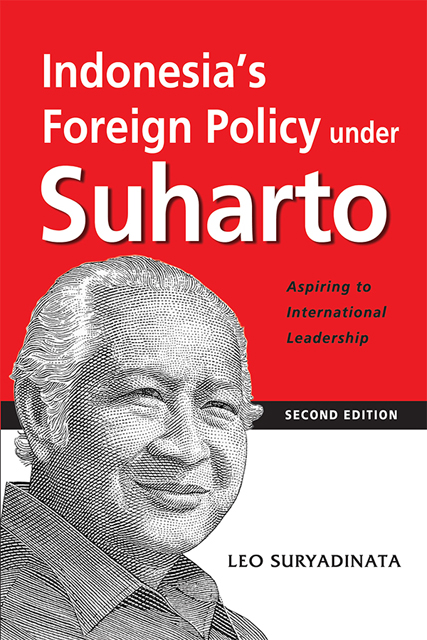Book contents
- Frontmatter
- Contents
- Preface to the Second Edition
- Preface
- Acknowledgements
- Introduction: Suharto’s Foreign Policy
- 1 Determinants of Indonesia’s Foreign Policy: In Search of an Explanation
- 2 Indonesia’s Foreign Policy before the New Order: In Search of a Format
- 3 Indonesia’s Foreign Policy during the “New Order” (I): The Rise of the Military
- 4 Indonesia’s Foreign Policy during the “New Order” (II): The Assertive Role of the President
- 5 Indonesia’s Relations with the ASEAN States: Regional Stability and Leadership Role
- 6 Indonesia’s Relations with Australia and Papua New Guinea: Security and Cultural Issues
- 7 Indonesia-China Relations: Ideology, Ethnic Chinese and the President
- 8 Indonesia-Vietnam Relations and the Kampuchean Issue: The Security Factor
- 9 Indonesia-Superpower Relations: Economic and Non-Economic Factors
- 10 Indonesia, the Middle East and Bosnia: Islam and Foreign Policy
- 11 Indonesia, the Non-Aligned Movement and APEC: In Search of a Leadership Role
- Conclusion: To Lead and Not to Be Led
- Postscript: Indonesia’s Foreign Policy from the Fall of Suharto to Joko Widodo: Still Aspiring to International Leadership?
- Bibliography
- Appendices
- Index
Conclusion: To Lead and Not to Be Led
Published online by Cambridge University Press: 01 September 2023
- Frontmatter
- Contents
- Preface to the Second Edition
- Preface
- Acknowledgements
- Introduction: Suharto’s Foreign Policy
- 1 Determinants of Indonesia’s Foreign Policy: In Search of an Explanation
- 2 Indonesia’s Foreign Policy before the New Order: In Search of a Format
- 3 Indonesia’s Foreign Policy during the “New Order” (I): The Rise of the Military
- 4 Indonesia’s Foreign Policy during the “New Order” (II): The Assertive Role of the President
- 5 Indonesia’s Relations with the ASEAN States: Regional Stability and Leadership Role
- 6 Indonesia’s Relations with Australia and Papua New Guinea: Security and Cultural Issues
- 7 Indonesia-China Relations: Ideology, Ethnic Chinese and the President
- 8 Indonesia-Vietnam Relations and the Kampuchean Issue: The Security Factor
- 9 Indonesia-Superpower Relations: Economic and Non-Economic Factors
- 10 Indonesia, the Middle East and Bosnia: Islam and Foreign Policy
- 11 Indonesia, the Non-Aligned Movement and APEC: In Search of a Leadership Role
- Conclusion: To Lead and Not to Be Led
- Postscript: Indonesia’s Foreign Policy from the Fall of Suharto to Joko Widodo: Still Aspiring to International Leadership?
- Bibliography
- Appendices
- Index
Summary
In analysing the foreign policy of a country, one has to identify the major elements of the foreign policy, for instance, the goals of foreign policy as defined by the power elite, the means to achieve this policy and the effectiveness of the policy. The aims of foreign policy usually include preserving national security, including the survival of the government or political system; maintaining territorial integrity; and promoting the welfare of the population. In addition to these, there are other goals which differ from country to country, depending on its size and capability and the role perception of its power elite. For instance, Indonesia under Sukarno was eager to project its image as that of a major nation, not only in the Southeast Asian region, but beyond. During the New Order period, however, it appears that Indonesia’s economic development became the major concern of the Government. This, however, did not mean that the New Order Government had abandoned its desire to become a regional leader and beyond.
As shown in this study, Indonesia’s foreign policy goals have been influenced by historical experience and the political culture of the elite. Since Indonesia obtained its political independence, partly through armed struggle and partly through diplomatic negotiation, the experience of the independence movement appears to have left an imprint on Indonesia’s foreign policy behaviour. Nationalism has been strong among Indonesia’s political leaders. This was reflected in Indonesia’s persistence in rejecting foreign military bases in Southeast Asia, especially in Indonesia. The second factor which has a bearing on Indonesia’s foreign policy goals has been its leaders’ perception of their role in world affairs. They consider Indonesia a major power or possibly even a global actor, the desire to be the Chairman of NAM and to hold the APEC Summit are two recent examples.
For global actors, the means for achieving a foreign policy goal are many, because they usually have tremendous resources which they can mobilize. They have both the economic and military capability to influence the course of world events. However, Indonesia’s resources are limited. It is true that Indonesia is rich in natural resources and has a large population, and thus has the potential to become a major power, but not a global power like the United States.
- Type
- Chapter
- Information
- Indonesia's Foreign Policy under SuhartoAspiring to International Leadership, pp. 186 - 189Publisher: ISEAS–Yusof Ishak InstituteFirst published in: 2023

